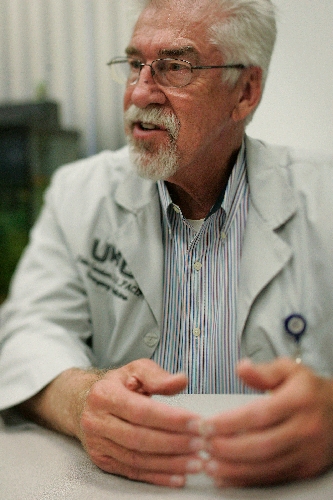Few cases of whooping cough in Nevada
So far, Nevada seems to have escaped relatively unscathed from the whooping cough epidemic that has hit California.
There are currently only eight cases of the contagious bacterial respiratory disease reported statewide, despite the close proximity and heavy volume of travel between Nevada and California.
Two of those cases are in Clark County, though nothing indicates a link between these cases and the California epidemic, said Martha Framsted, state health department spokeswoman.
That number is down significantly from the 24 cases reported in all of 2009 and the 28 cases reported in 2008, according to state health officials.
"We are actively watching this, of course," Framsted said. "We're keeping a close eye on cases reported to us and tracing back to see if there is a California connection. There are no connections we can determine at this time, they're all sporadic cases."
The Southern Nevada Health District recently issued a bulletin to doctors and parents as a precaution about getting children immunized before they go on vacation to prevent any risk of transmitting the disease.
Health officials advise physicians, parents and caregivers to update their vaccinations because the disease can result in hospitalization for severe respiratory distress and inflammation of the brain in children less than one year old. In very rare cases, it also can lead to death in these children.
More than 900 cases of the disease have been reported in California, including five infant deaths. Health officials there have declared an epidemic, which means the disease is excessively prevalent within a population at the same time.
It's one of the worst years for whooping cough in five decades, California health officials said.
Pertussis, more commonly known as whooping cough, begins with a mild cough, a runny nose and sneezing, a seemingly mild annoyance resembling a common cold.
But it develops into uncontrollable fits of coughing that can be followed by vomiting, and the disease lingers for up to six weeks.
Dr. Dale Carrison, who heads emergency room services at University Medical Center here, said he vividly remembers battling whooping cough as a young boy in the 1940s, when a vaccine was nonexistent.
"It's one of my childhood memories," Carrison said. "I could tell you the bed I was in, where the windows in the room were and how I coughed and coughed and coughed incessantly."
Carrison couldn't swallow "those nasty sulfa drugs without throwing up." So his mother put them in jelly.
"I just remember not being able to stop coughing," he said. "I was trying to get air and trying to breathe."
Carrison said he does not expect to see an influx of whooping cough cases of epidemic proportions in Nevada, however, the numbers will inevitably increase.
Some doctors across the nation have complained that the cost of the vaccine is too high.
"Cost is a problem in medicine," Carrison said. "Cost is a problem in this hospital. We've lost all this money, but where would all the people we take care of go if we weren't here?"
Emergency departments and private pediatrician offices are the best places to gather information on whether Nevada would experience an epidemic, he said.
Some parents refused to inoculate their children fearing they would become infected by the vaccine. Others believe there is a connection between the vaccine and autism, though scientific research has proven that untrue, said Jeffrey Dimond, Centers for Disease Control and Prevention spokesman.
"It's very contagious, but very preventable," Dimond said. "That claim has been disproven over and over again. There are people who would rather believe an Internet rumor than scientific facts."
The disease is cyclical, and it reoccurs every three to five years. The vaccine tends to wane over time, and that waning may have something to do with its cyclical nature, which makes vaccinations so important, Carrison added.
"It's so frustrating because we know that if everyone had been immunized like they were supposed to be, we wouldn't have this outbreak right now," he said. "This outbreak would not be occurring."
Contact Kristi Jourdan at kjourdan@reviewjournal.com or 702-383-0279.
NEVADA PERTUSSIS CASES
Whooping cough cases statewide:
2010 -- 8 (reported so far)
2009 -- 24
2008 -- 28
2007 -- 37
2006 -- 71
2005 -- 50
Source: Nevada Department of Health and Human Services
For more information:
Centers for Disease Control
Great Basin Primary Care Association of Nevada
LAS VEGAS REVIEW-JOURNAL

















